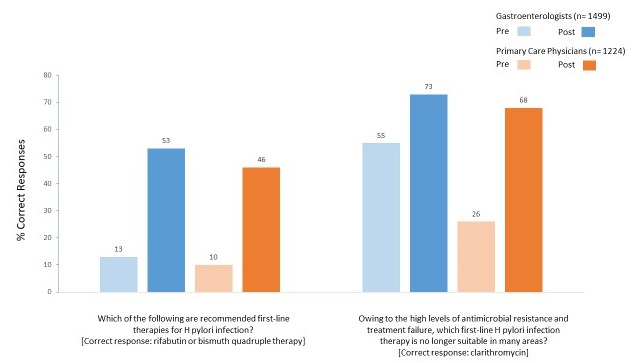Back
Poster Session E - Tuesday Afternoon
E0686 - Education on the Treatment of H. pylori Infection Improves Clinician Knowledge
Tuesday, October 25, 2022
3:00 PM – 5:00 PM ET
Location: Crown Ballroom

Shari Dermer, PhD
Medscape Education
New York, NY
Presenting Author(s)
Jovana Lubarda, PhD1, Shari Dermer, PhD1, Colin W. Howden, MD, FACG2
1Medscape Education, New York, NY; 2University of Tennessee College of Medicine, Lake Forest, IL
Introduction: The prevalence of H. pylori infection in US adults is around 35%. Eradication of H. pylori is essential to the successful management of peptic ulcer disease, and the potential prevention of gastric cancer. The goal of this project was to assess the role of continuing medical education (CME) on improving learners’ knowledge regarding evidence-based treatment of H. pylori infection.
Methods: Gastroenterologists (N =1499) and primary care physicians (PCPs; N =1224) participated in an online text-based CME/CE activity on the diagnosis and treatment of H. pylori infection (1). Educational effect was assessed using a repeated-pair design with pre-/post-assessment and 2 multiple choice questions. This assessed knowledge and included evaluation questions that gauged patient numbers and overall satisfaction with the education. We calculated relative improvement ([post%-pre%]/pre%) to examine change in percentage of correct responses. We used the chi-squared test for significance testing on the number of correct responses pre- to post-activity with P < 0.05 considered statistically significant. The online CME activity launched on October 15, 2021; data were collected on May 31, 2022.
Results: 66% of gastroenterologists and 60% of PCPs strongly agreed that this education increased their knowledge regarding evidence-based treatments for H. pylori infection.
First line therapy for H. pylori infection: Gastroenterologists had a 308% relative increase (13%/53% pre/post; p < .05), and PCPs had a 360% relative increase (10%/46%, pre/post; p < .05) in knowledge regarding recommended first-line treatment of H. pylori infection (Figure 1).
Antibiotic resistance and H. pylori treatment: Gastroenterologists had a 33% relative increase (55%/73%, pre/post; p < .05), and PCPs had a 162% relative increase (26%/68%, pre/post; p < .05) in knowledge about antibiotic resistance to clarithromycin in patients with H. pylori infection (Figure 1).
Discussion: We found significant improvement in knowledge among gastroenterologists and PCPs regarding evidence-based management of H. pylori infection. However, additional educational effort is required to close some clinical knowledge gaps regarding selection of first-line treatment for H. pylori infection and resistance to antibiotics, with particular emphasis on clarithromycin.
Reference
1. Howden CW, Moss SF, Graham DY. Optimizing the Management of Helicobacter pylori Infections. October 21, 2021. Available at: https://www.medscape.org/viewarticle/960805.

Disclosures:
Jovana Lubarda, PhD1, Shari Dermer, PhD1, Colin W. Howden, MD, FACG2. E0686 - Education on the Treatment of H. pylori Infection Improves Clinician Knowledge, ACG 2022 Annual Scientific Meeting Abstracts. Charlotte, NC: American College of Gastroenterology.
1Medscape Education, New York, NY; 2University of Tennessee College of Medicine, Lake Forest, IL
Introduction: The prevalence of H. pylori infection in US adults is around 35%. Eradication of H. pylori is essential to the successful management of peptic ulcer disease, and the potential prevention of gastric cancer. The goal of this project was to assess the role of continuing medical education (CME) on improving learners’ knowledge regarding evidence-based treatment of H. pylori infection.
Methods: Gastroenterologists (N =1499) and primary care physicians (PCPs; N =1224) participated in an online text-based CME/CE activity on the diagnosis and treatment of H. pylori infection (1). Educational effect was assessed using a repeated-pair design with pre-/post-assessment and 2 multiple choice questions. This assessed knowledge and included evaluation questions that gauged patient numbers and overall satisfaction with the education. We calculated relative improvement ([post%-pre%]/pre%) to examine change in percentage of correct responses. We used the chi-squared test for significance testing on the number of correct responses pre- to post-activity with P < 0.05 considered statistically significant. The online CME activity launched on October 15, 2021; data were collected on May 31, 2022.
Results: 66% of gastroenterologists and 60% of PCPs strongly agreed that this education increased their knowledge regarding evidence-based treatments for H. pylori infection.
First line therapy for H. pylori infection: Gastroenterologists had a 308% relative increase (13%/53% pre/post; p < .05), and PCPs had a 360% relative increase (10%/46%, pre/post; p < .05) in knowledge regarding recommended first-line treatment of H. pylori infection (Figure 1).
Antibiotic resistance and H. pylori treatment: Gastroenterologists had a 33% relative increase (55%/73%, pre/post; p < .05), and PCPs had a 162% relative increase (26%/68%, pre/post; p < .05) in knowledge about antibiotic resistance to clarithromycin in patients with H. pylori infection (Figure 1).
Discussion: We found significant improvement in knowledge among gastroenterologists and PCPs regarding evidence-based management of H. pylori infection. However, additional educational effort is required to close some clinical knowledge gaps regarding selection of first-line treatment for H. pylori infection and resistance to antibiotics, with particular emphasis on clarithromycin.
Reference
1. Howden CW, Moss SF, Graham DY. Optimizing the Management of Helicobacter pylori Infections. October 21, 2021. Available at: https://www.medscape.org/viewarticle/960805.

Figure: Figure 1
Disclosures:
Jovana Lubarda indicated no relevant financial relationships.
Shari Dermer indicated no relevant financial relationships.
Colin Howden: Allakos – Consultant. Alnylam – Speakers Bureau. Antibe – Stock-privately held company. Ironwood – Consultant. Neurogastrx – Consultant. Phathon Pharmaceuticals – Consultant, Speakers Bureau. RedHill Biopharma – Consultant, Speakers Bureau. Sanofi/Genzyme – Speakers Bureau.
Jovana Lubarda, PhD1, Shari Dermer, PhD1, Colin W. Howden, MD, FACG2. E0686 - Education on the Treatment of H. pylori Infection Improves Clinician Knowledge, ACG 2022 Annual Scientific Meeting Abstracts. Charlotte, NC: American College of Gastroenterology.

